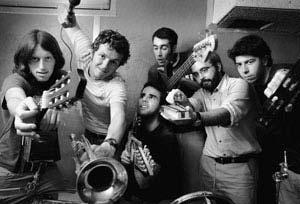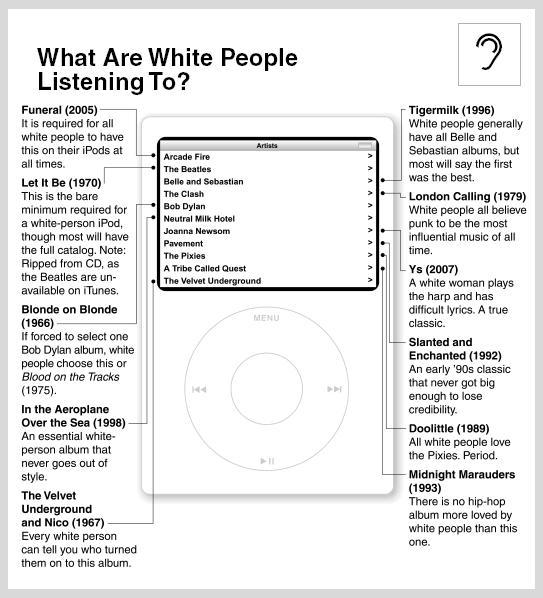Stuff White People Like (9 page)
Read Stuff White People Like Online
Authors: Christian Lander
Tags: #General, #Humor, #Topic, #American wit and humor, #Popular Culture, #Adult, #Popular culture - United States, #Race identity, #Whites, #Satire And Humor, #Topic - Adult, #Race awareness, #Whites - United States

Knowledge of Apple products can be useful in a number of social situations. If you see a white person with a Mac, an easy way to approach them is to say, “Is that a Powerbook? What OS do you have?” They will happily start talking to you, and after the requisite five minutes you can invite them to a screening of a documentary.
41 Indie Music
If you want to understand white people, you need to understand indie music. As mentioned before, white people hate anything that’s “mainstream” and are desperate to find things that are more genuine, unique, and reflective of their experiences.
Fortunately, they have independent music.

A white person’s iPod (formerly CD collection) is not merely an assemblage of music that they enjoy. It is what defines them as a person. They are always on the lookout for the latest hot band that no one has heard of, so that one day they can hit it just right and be into a band
before
it is featured in an Apple commercial. To a white person, being a fan of a band before it gets popular is one of the most important things they can do with their life. They can hold it over their friends forever!
Indie music also produces a lot of concerts, at which white people can meet other white people. Concerts are useful, because if white people are attending the same concert, it means they both like the artist and can easily strike up a conversation that will flow from band at the show other bands they like
other bands they like where they went to/go to school
where they went to/go to school where to get the best vegan food in town
where to get the best vegan food in town agreement to meet at said restaurant for awkward date.
agreement to meet at said restaurant for awkward date.
It is worth noting that white people are expected to stay current with music and go to concerts well into their forties. Unlike at dance or hip-hop clubs, there are few stigmas attached to being the “old guy at the club.”
WARNING: Indie music is perhaps the most dangerous subject you can discuss with white people. One false move and you will lose their respect and admiration forever. Here are some general rules:
• Bands that have had their songs in an Apple ad are still marginally acceptable.
• Bands that have had their songs in ads for other companies are not acceptable.
• If you mention a band you like and the other person has heard of it, you lose. They own you. It is essential that you like the most obscure music possible.
Remember, popular artists can turn unpopular in a heartbeat (Ryan Adams, Bright Eyes, the Strokes), so you would be best to stick to the following statements: “I love Arcade Fire” “I still think the Montreal scene is the best in the world” “I would die without Stereogum or Fluxblog”
*1
; and “Joanna Newsom is maybe the most original artist today.”

42 Sushi
Regardless of whether they are vegetarian, vegan, or just guilty about eating meat, all white people love sushi. To them, it’s everything they want: foreign culture, expensive, healthy, and hated by the “uneducated.”
But there are different levels of white-person sushi love. At the bottom are the spicy tuna/California roll eaters. These are the people who get their fix at places named Rock And Roll!, Magic Sushi Company, or Trader Joe’s–type supermarkets. Often this sushi isn’t the most authentic, but white people can’t get enough!

The next level up is the entry-level sushi snob. These are people who still love rolls but are willing to branch out to salmon and tuna sashimi, maybe even eel.
Finally, you have the white sushi snob. These people just take it all way too far. Often they will sit only at the sushi bar, will try to order in Japanese, and will only order the
omakase.
These people will often be extremely critical of anyone who eats a roll of any type or does not properly flip the nigiri into his mouth.
When white people get sushi, they all want to order sake to complete the authentic experience.
So how can this information be turned into personal gain?
White people are obsessed with finding good sushi; therefore, if you offer to take them to “the best sushi place” in town, you are sure to have them accept. If you are an Asian man, this is an almost no-fail method of getting dates with white girls, and maybe, just maybe, joining Bruce Lee and Paul Kariya’s dad.
In addition, going out for sushi is considered a special evening in white-person culture. Not as special as brunch, but still, it comes with expectations.
But what if the person you are interested in is a vegetarian? Not a problem. For some reason, most white people who say they are vegetarians will eat sushi. Apparently, fish aren’t cute enough to warrant inclusion with pigs, chickens, and cows.
43 Plays
While white people certainly love “the cinema,” they are required to balance their interest in film with an interest in live theater, most notably, plays.
In spite of plays having minimal sets, no special effects, an intermission, and a higher admission price, white people believe that live theater is essential to any cultured city. It is not known if white people actually enjoy plays or if they are just victims of massive peer pressure from the 75 percent of white people who have acted in a play at some point in their life.

The only real advice around this subject is to never accept an invitation from a white person to go see a play. Often you will be supporting their friend or cousin and then get stuck with a $45 ticket (at least) and three hours of trying to figure how close you are to the end.
44 Public Radio
The lack of a television has left many white people without viable entertainment, and as much as they would like to believe that they can read books during every moment of their free time, it’s simply not possible. They need something to fill the gap and provide background noise while they play on the Internet. They need public radio.
Public radio provides white people with news and information that has the proper perspective (their own). It is very important for white people to have a news source that isn’t tied to profits or major corporations; public radio has the freedom to pursue hard-hitting stories and provide the only truly objective voice in the national media. Because if a news outlet were to depend on one source for their funding, it would have to constantly produce stories that interest and reassure that group, thus making it almost worthless to people outside of that group. You are probably thinking, “Wait a second, doesn’t public radio get most of its money through donations by white people?” If so, you are right, and while this sort of explains NPR’s programming choices, political bias, and staff, it’s not a good idea to point it out to white people.
